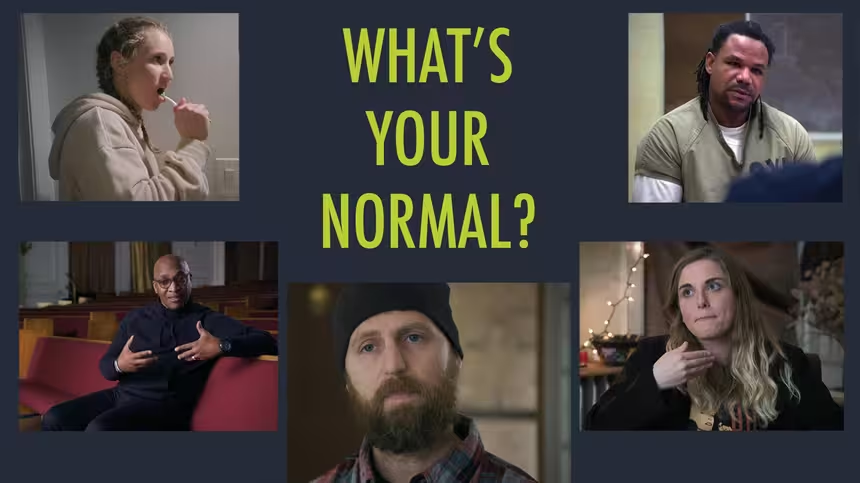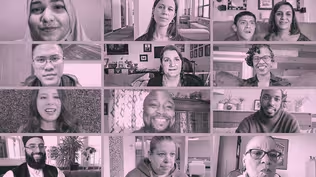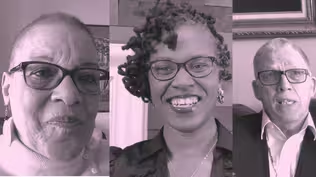
Natasha Stovall | Decolonizing Mental Health
Special | 5m 51sVideo has Closed Captions
Natasha Stovall’s centering of whiteness aims to cure psychiatry’s colorblindness.
For Natasha Stovall, whiteness is the real elephant in the room. Through her practice, she intends to address the colorblindness and race-agnostic nature of therapy, especially when it comes to white clients. She makes race the touchstone for effective and just therapy which consequently deconstructs the whiteness=greatness fallacy in white psyches.
Problems playing video? | Closed Captioning Feedback
Problems playing video? | Closed Captioning Feedback
Funding for Mysteries of Mental Illness is provided by the Corporation for Public Broadcasting, Johnson & Johnson, the American Psychiatric Association Foundation, and Draper, and through the support of PBS...

Natasha Stovall | Decolonizing Mental Health
Special | 5m 51sVideo has Closed Captions
For Natasha Stovall, whiteness is the real elephant in the room. Through her practice, she intends to address the colorblindness and race-agnostic nature of therapy, especially when it comes to white clients. She makes race the touchstone for effective and just therapy which consequently deconstructs the whiteness=greatness fallacy in white psyches.
Problems playing video? | Closed Captioning Feedback
How to Watch Mysteries of Mental Illness
Mysteries of Mental Illness is available to stream on pbs.org and the free PBS App, available on iPhone, Apple TV, Android TV, Android smartphones, Amazon Fire TV, Amazon Fire Tablet, Roku, Samsung Smart TV, and Vizio.

Join the Campaign
Share your story of dealing with mental illness through textual commentary, a still image, a short-form video — however you feel most comfortable — using the hashtag #MentalHealthPBS on social media.(static) (children laughing) (soft gentle music) - I love this metaphor of whiteness being like Christmas but it's also Christmas that never ends.
You're just constantly in this Groundhog Day of Christmas.
Psychoanalyst, Melanie Suchet, who's South African, talks about the "You can never get out of whiteness."
(children laughing) I always knew I was white, from a very young... Like I didn't grow up in color blindness.
I grew up in Washington DC, which, when I was growing up was a majority black city.
My parents were very sincere about wanting to be part of the solution of racism and were both involved in the civil rights movement.
(people singing gospel music) I think I just grew up with an understanding of myself and my family as being part of the solution, not part of the problem.
(soft gentle music) But I think the thing that's important for the work that I'm doing now, is that despite the fact that my family was sort of more conscious of race and racism and not wanting to contribute to that, nonetheless, the patterns of our family in many ways reinforced the larger structure of white supremacy, without much thought.
(soft slow music) I was working in a state psychiatric hospital.
There's a big economic and structural component to why people are there in the first place.
Usually people in state psychiatric hospitals are poor.
By the time that they get there, they've usually been failed by social systems many times, for many decades.
Whether it's education, housing, incarceration, violent communities, lack of access to healthcare.
There are all of these ways that people are traumatized by the social structures that are supposed to be helping, but also that these social structures are sort of actively interfering with people trying to get better on their own.
I was encouraged to reflect on my own experiences and my own what we call, "Social Location" and my own background and to understand why my experiences were not really translatable.
That I was gonna have to learn a lot about how the world worked, how these systems worked, to become more realistic myself.
I had a lot of training about being a culturally competent therapist for people who were not white.
But when it came to working with people who were white, there was no such thing as cultural competency.
When I transitioned to private practice it was almost like a switch flipped.
I was working with this completely different demographic of people.
Mostly professional, mostly white collar and mostly white.
(tense anxious music) One thing I immediately noticed is that social systems were not something that we discussed.
Whatever the situations were that were causing people stress, like relationships, family, work, illness, grief, trauma, none of this, in any way, was related to the social structure.
And it certainly wasn't related to race.
The therapy that I was doing was just totally colorblind and race blind, and that felt strange, but it also felt suspicious.
Like it didn't seem realistic to me.
I didn't necessarily completely believe that that was honest, but I felt that people were really socialized not to talk about race and with another white person especially there was no reason to.
There's all of these ways in which the psyche is constantly being kind of pushed and pulled and frustrated that we conceptualize as just normal life.
But it really is normal life inside of in European-descended framework of living.
This isn't cross-cultural.
This need to define, to advance, to rise above, to kind of keep on moving.
The difficulty sitting still, the anxiety, the kind of defeatedness when there can't be constant progress which is the depression.
The rage that comes from feeling like I'm not getting what's coming to me, what's due to me.
(people screaming) There should be more attention paid in the training of psychotherapists of how they're gonna work with race with white clients, as opposed to just maintaining this kind of colorblind therapy, that is the norm.
Yes, there's resistance, but there's also a hunger for white clients in therapy, to be able to use the space to actually talk about things that they find difficult or that they want to do differently.
(soft gentle music)

- Science and Nature

Explore scientific discoveries on television's most acclaimed science documentary series.

- Science and Nature

Capturing the splendor of the natural world, from the African plains to the Antarctic ice.












Support for PBS provided by:
Funding for Mysteries of Mental Illness is provided by the Corporation for Public Broadcasting, Johnson & Johnson, the American Psychiatric Association Foundation, and Draper, and through the support of PBS...

